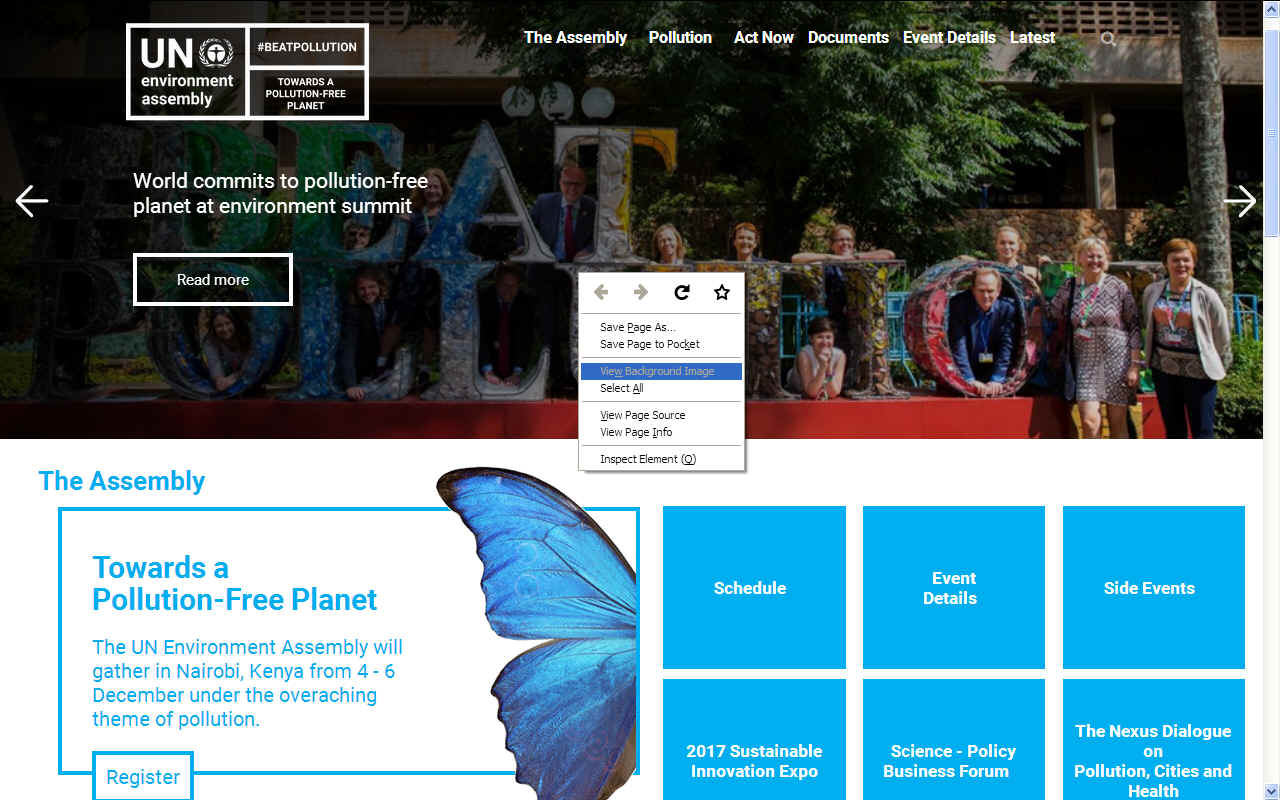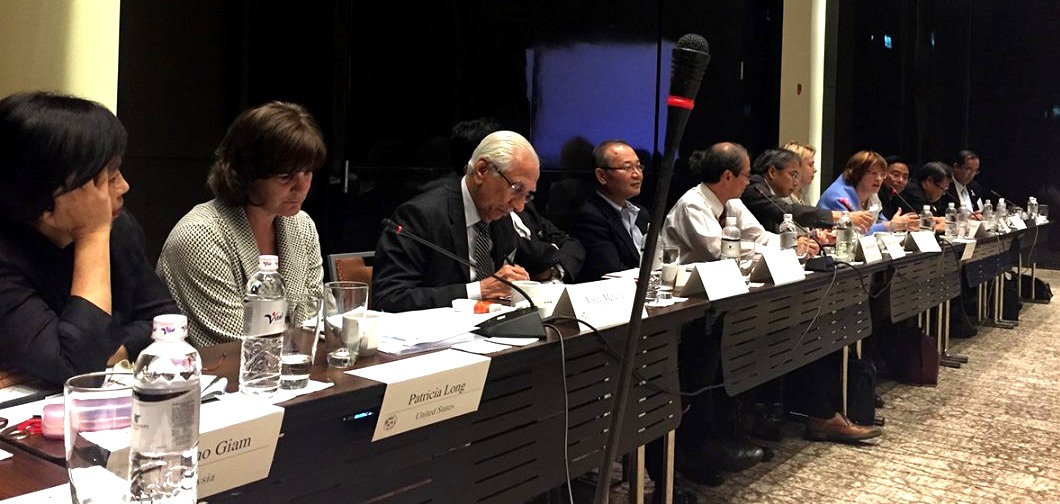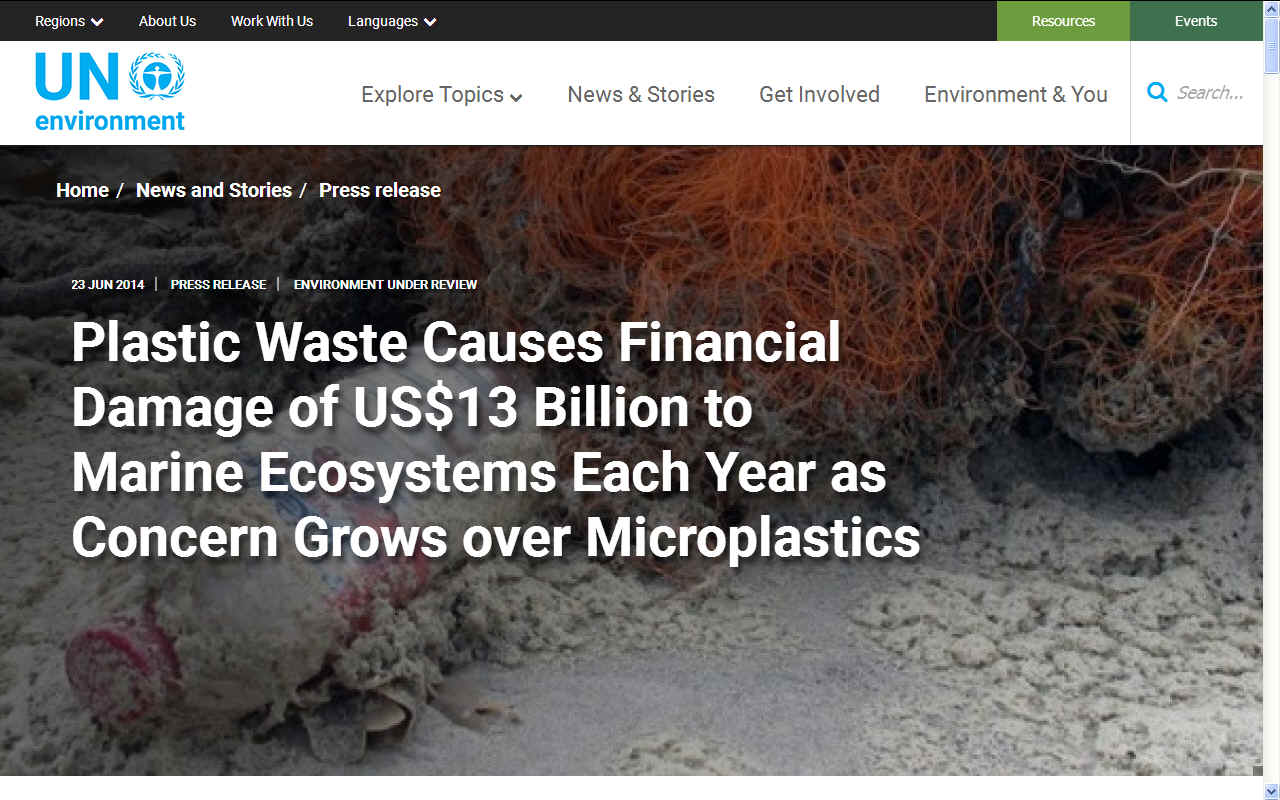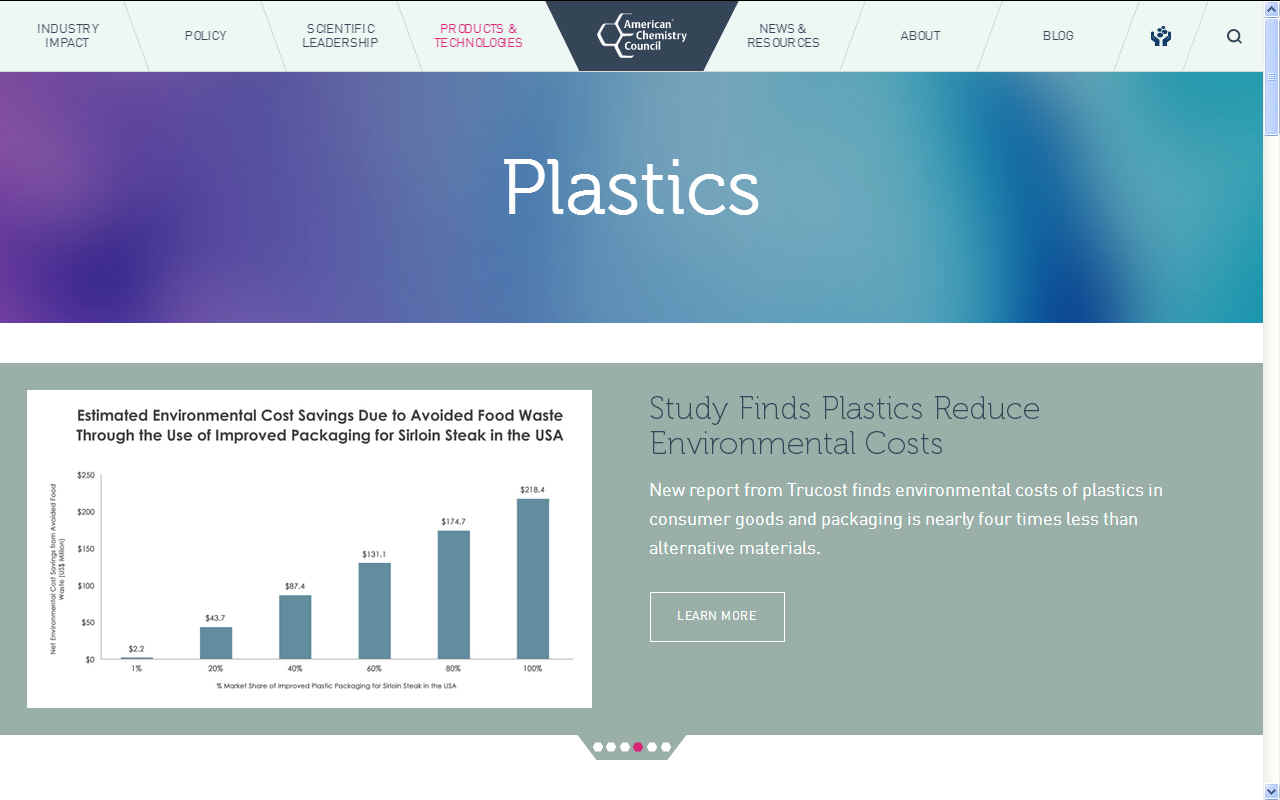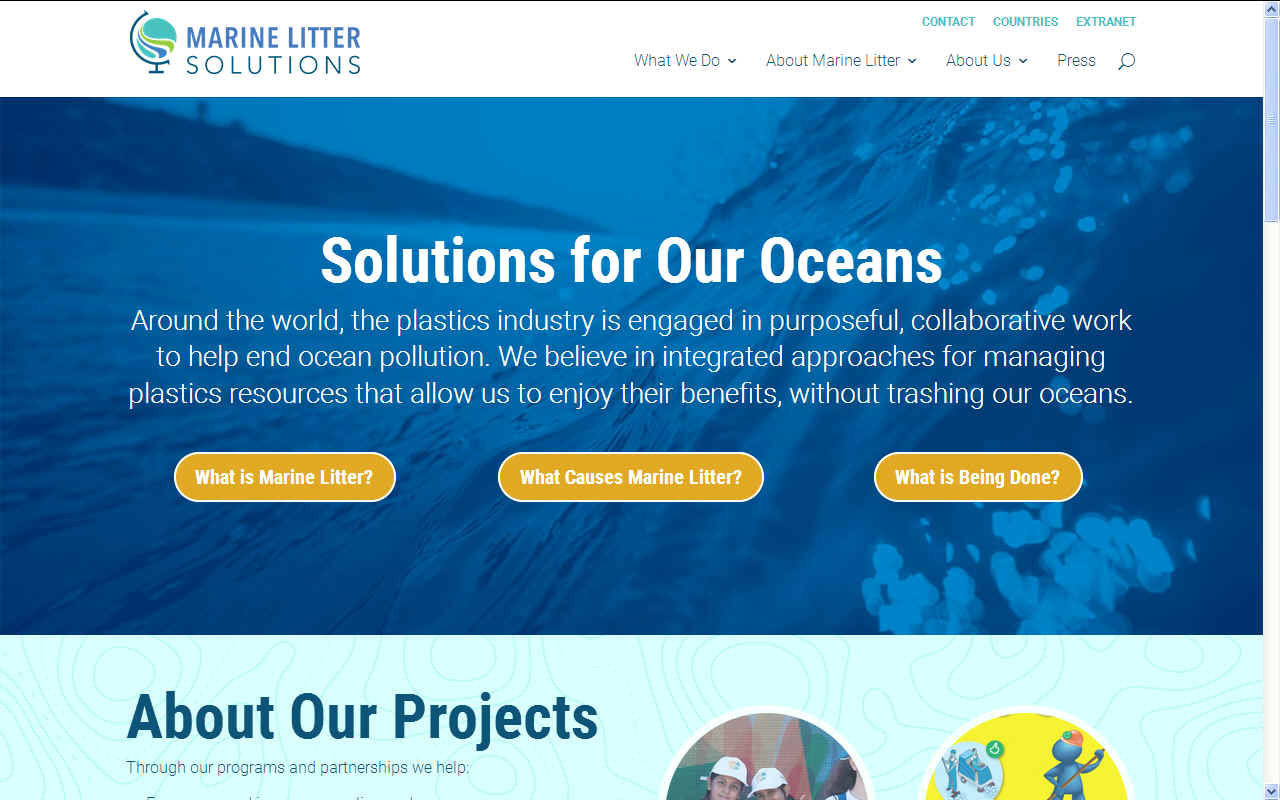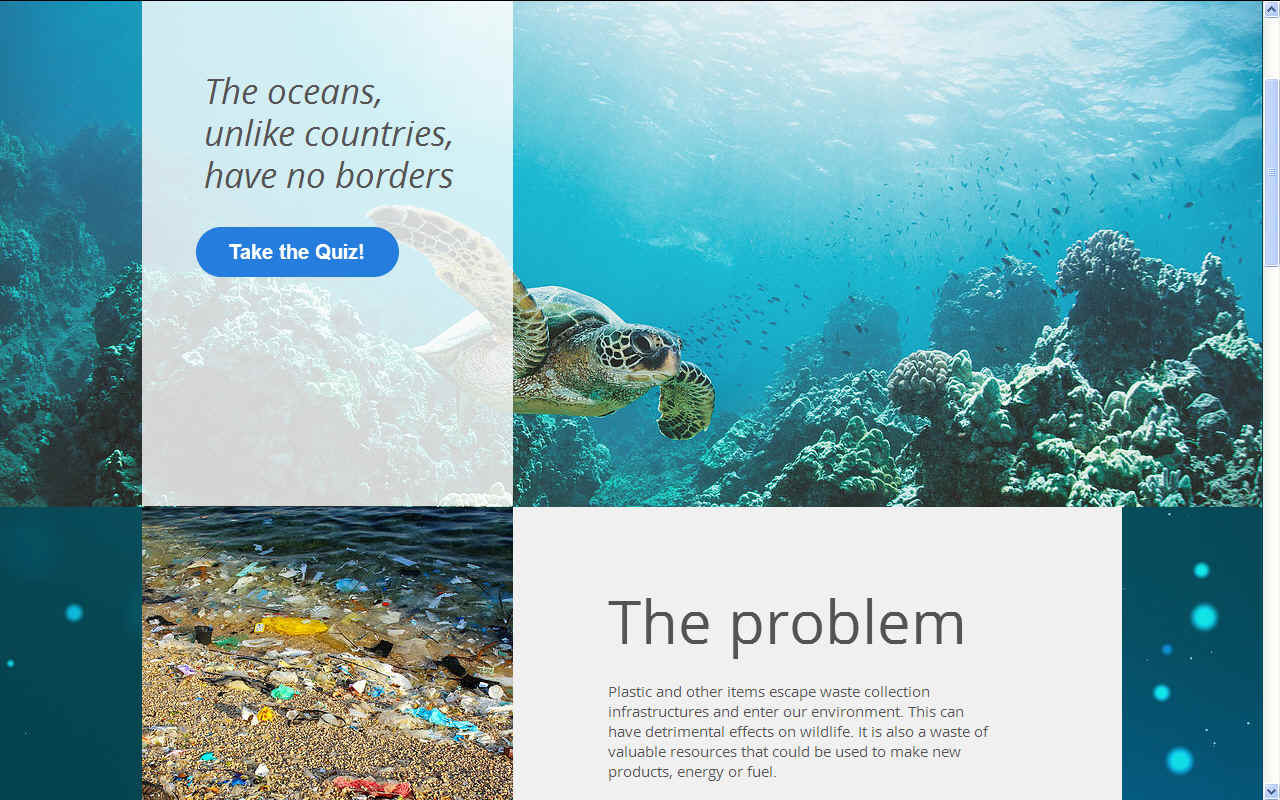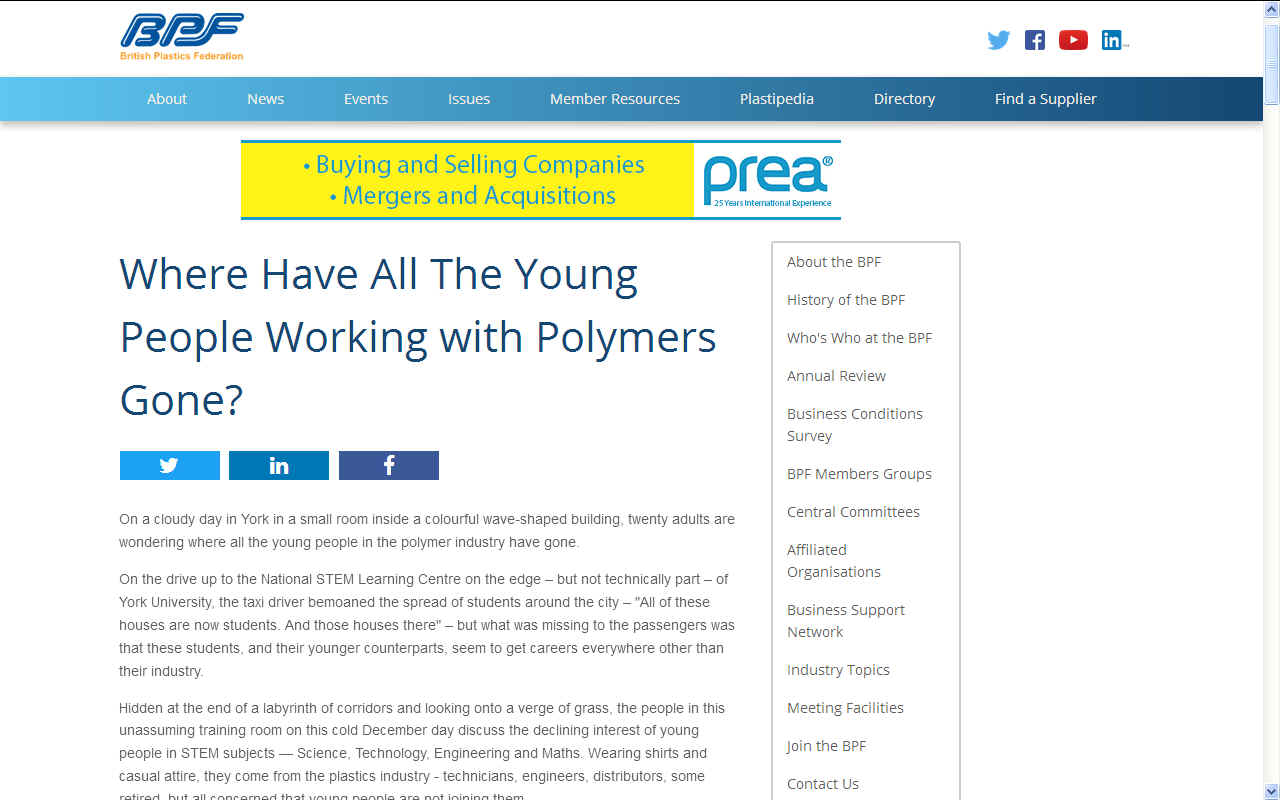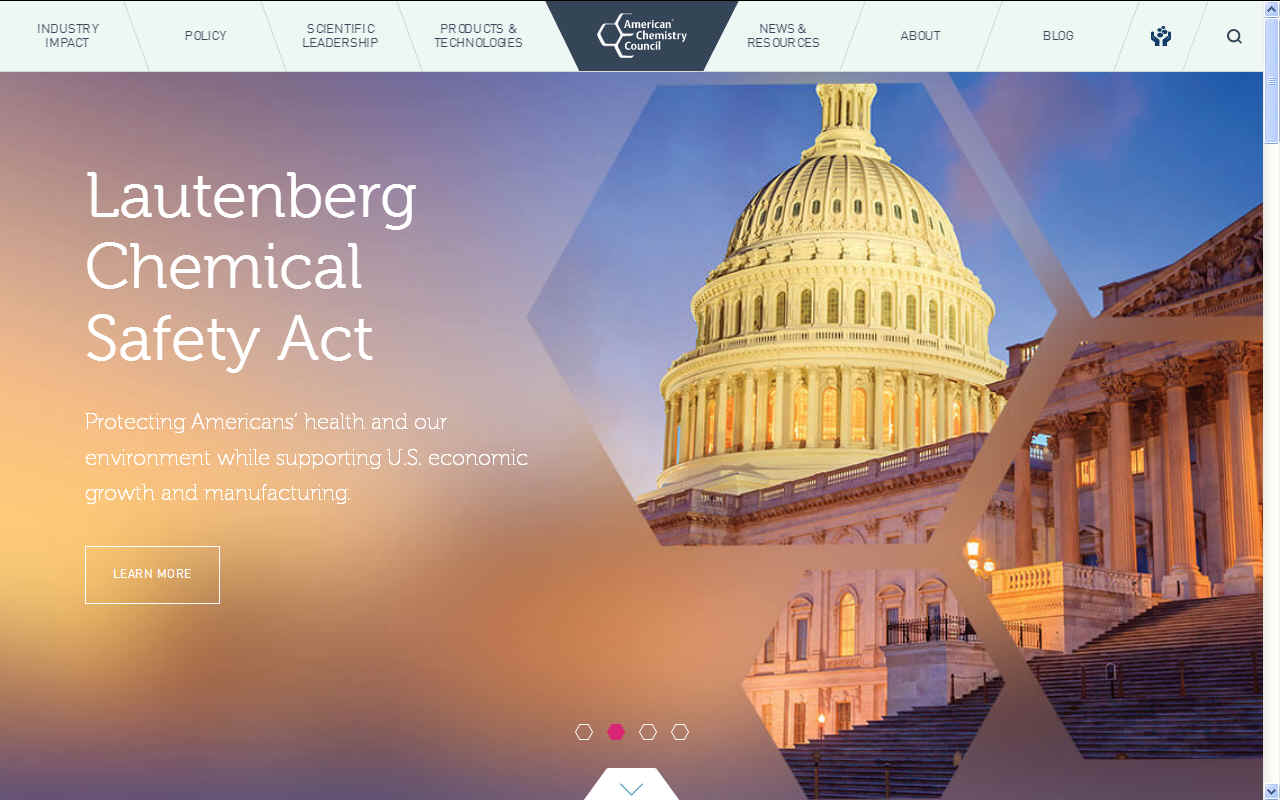|
MARINE LITTER
ABOUT - A-Z INDEX - CONTACTS - FOUNDATION - HOME - REGISTER
Combating marine litter is one of the biggest challenges of our time. Not unnaturally, the plastics industry is on the defensive where commercial investment is considerable and there is a good case for plastics as many of the products made of the substances that we take for granted in everyday life would be difficult, if not impossible to replace with alternatives. We doubt that many rational people would argue about that, but our concern is responsible use, that involves recycling and educating the public as to socially acceptable disposal such as to reduce our plastic footprint in real terms.
The objective of the lobbying and other efforts of the Cleaner Ocean Foundation is to find ways that humans can continue to use plastic without harming the natural world. The last resort should be ocean cleaning machines, but this may be inevitable in light of the build up of waste over so many years of inaction, that it makes us angry for the plight of wildlife - to include the fish that feed us as well as the marine mammals and birds that are eating our single use packaging waste and getting entangled in our fishing nets.
UNEA3 - The third meeting of the UN Environment Assembly was held on an exceptional basis, from 4-6 December 2017, with the high-level segment taking place on 5-6 December, and the Open Ended Committee of Permanent Representatives (OECPR) from 29 November to 1 December in Nairobi, Kenya. It was agreed that marine litter should be prioritized. Read more on by clicking on the picture above.
BRUSSELS 9 NOV 2017 MARINE LITTER LATEST: Claus Schultze from the DG MARE maritime innovation and marine knowledge & investment section of the European Union is seen here giving a passionate talk on marine litter to a packed house of some 247 delegates that, the present EMFF call was a pilot action and that it was up to the stakeholders represented by those in the audience, to provide feedback. In this speech it was acknowledged that desperately needed innovation "can only happen if we invest." The EU was taking this action in the hope of bridging the "financing gap," what he described as the "valley of death." The focus was on drivers and innovation. We could not agree with the speaker more and thank the EMFF for putting marine litter on their agenda. Our man in Brussels asked the question about Brexit and how that might affect any UK involvement as to project proposals.
Ocean literacy is one of the weapons in our armoury to combat ocean pollution. Our campaign is based on reason, seeking to define the facts and separate them from fiction and spin - to enable us to find common ground on which to build a society that can live with plastic on firm ethical and moral terms. By supporting us our associates and partners are contributing to essential research that may guide corporations and policy makers as to what is promising and the appropriate remedies that could be available - made possible by our increasing knowledge of technology and the state and pace of development that is considered necessary to contain waste that has no place in the open ocean or landfill where it may affect agriculture and ocean regeneration.
Our ocean tour is to include a powerfully immersive 3D underwater experience that is designed to thrill audiences with the wonders of the ocean in the form of sharks, whales, dolphins and more.
AMERICAN CHEMISTRY COUNCIL MARCH 2017
WASHINGTON
- The U.S. Senate today introduced a bipartisan bill (S. 756) to reauthorize the
NOAA Marine Debris Program and promote international action to reduce marine debris. The American Chemistry Council, which has partnered with a broad range of stakeholders to prevent and create solutions for marine debris, issued the following
statement, which may be attributed to ACC’s President and CEO Cal Dooley:
UNITED NATIONS ENVIRONMENT PROGRAMME - MAY 2016
WASHINGTON
- The United Nations Environment Programme (UNEP) today released a new report entitled “Marine Plastic Debris and Microplastics: Global lessons and research to inspire action and guide policy.” The report emphasizes that “Improving waste collection and management presents the most urgent short-term solution to reducing plastic inputs (into oceans and waterways), especially in developing economies. This will also have other societal benefits in terms of human health, environmental degradation, and economic development.” The report also notes that based on the “available limited evidence, it is concluded that microplastics in seafood do not currently represent a human health risk, although many
uncertainties remain.”
PLASTICS:
The Plastics Division of the American Chemistry Council (ACC) represents leading manufacturers of plastic resins. We may not think about them often, but versatile plastics inspire countless innovations that help make life better, healthier and safer
for humans every day.
TRUCOST STUDY
A newer study by Trucost finds the environmental cost of using plastics in consumer goods and packaging is nearly four times less than it would be if plastics were replaced with alternative materials. The study is based on natural capital accounting methods, which measure and value environmental impacts - such as consumption of natural water and emissions to air, land and water - which are not typically factored into traditional financial accounting.
Previous reports, such as “Valuing Plastics” (2014) by Trucost and “The New Plastics Economy: Rethinking the Future of Plastics” (2016) by the World Economic Forum, only examined the environmental costs of using plastics. Trucost’s latest study, “Plastics and Sustainability: A Valuation of Environmental Benefits, Costs, and Opportunities for Continuous Improvement,” builds on earlier research by comparing the environmental costs of using plastics to alternative materials and identifying opportunities to help lower the environmental costs of using plastics in consumer goods and packaging.
These significant results disrupt a common misperception around plastics. Trucost found that replacing plastics in consumer products and packaging with a mix of alternative materials that provide the same function would increase environmental costs from $139 billion to $533 billion annually. That’s because strong, lightweight plastics help us do more with less material, which provides environmental benefits throughout the lifecycle of plastic products and packaging.
The study also concluded that the environmental costs of alternative materials can be lower per ton of production but are greater in aggregate due to the much larger quantities of material needed to fulfill the same purposes as plastics. In addition, the report’s authors recommend steps to help further reduce plastics’ overall environmental costs, such as by increasing the use of lower-carbon electricity in plastics production, adopting lower-emission transport modes, developing even more efficient plastic packaging, and increasing recycling and energy conversion of post-use plastics to help curb ocean litter and conserve resources.
VALUING PLASTIC
Valuing Plastic, a UNEP-supported report produced by the Plastic Disclosure Project (PDP) and Trucost, makes the business case for managing and disclosing plastic use in the consumer goods industry. It finds that the overall natural capital cost of plastic use in the consumer goods sector each year is US$75 billion - financial impacts resulting from issues such as pollution of the marine environment or air pollution caused by incinerating plastic.
The report says that over 30 per cent of the natural capital costs of plastic are due to greenhouse gas emissions from raw material extraction and processing. However, it notes that marine pollution is the largest downstream cost, and that the figure of US$13 billion is likely a significant underestimate.
"Plastics have come to play a crucial role in modern life, but the environmental impacts of the way we use them cannot be ignored," said Achim Steiner, UN Under-Secretary-General and UNEP Executive Director. "These reports show that reducing, recycling and redesigning products that use plastics can bring multiple green economy benefits - from reducing economic damage to marine ecosystems and the tourism and fisheries industries, vital for many developing countries, to bringing savings and opportunities for innovation to companies while reducing reputational risks."
"Our economies are still largely fossil-fuel based, with the environmental, economic and health costs hidden," he added. "For example, in the polar regions, scientists have recently found tiny pieces of plastic trapped in sea ice. Transported by ocean currents across great distances, these contaminated particles eventually become a source of chemicals in our food. The key course of action is to prevent plastic debris from entering the environment in the first place, which translates into a single powerful objective: reduce, reuse, recycle."
A large and unquantifiable amount of plastic waste enters the ocean from littering, poorly managed landfills, tourist activities and fisheries. Some of this material sinks to the ocean floor, while some floats and can travel over great distances on ocean currents - polluting shorelines and accumulating in massive mid-ocean gyres.
There have been many reliable reports of environmental damage due to plastic waste: mortality or illness when ingested by sea creatures such as turtles, entanglement of animals such as dolphins and whales, and damage to critical habitats such as coral reefs. There are also concerns about chemical contamination, invasive species spread by plastic fragments, and economic damage to the fishing and tourism industries in many countries - by, for example, fouling fishing equipment and polluting beaches.
Since 2011, when the UNEP Year Book process last looked at plastic waste in the ocean, concern has grown over microplastics (particles up to 5 mm in diameter, either manufactured or created when plastic breaks down). Their ingestion has been widely reported in marine organisms, including seabirds, fish, mussels, worms and zooplankton. One emerging issue is the increasing use of microplastics directly in consumer products, such as microbeads in toothpaste, gels and facial cleansers, the Year Book says. These microplastics tend not to be filtered out during sewage treatment, but are released directly into rivers, lakes and the ocean.
Communities of microbes have been discovered thriving on microplastics at multiple locations in the North Atlantic. This "plastisphere" can facilitate the transport of harmful microbes, pathogens and algal species. Microplastics have also been identified as a threat to larger organisms, such as the endangered northern right whale, which is potentially exposed to ingestion through filter-feeding.
Production trends, use patterns and changing demographics are expected to cause increasing plastic use, and both reports call for companies, institutions and consumers to reduce their waste.
Valuing Plastic finds that consumer goods companies currently save US$4 billion each year through good management of plastic, such as recycling, and that there is potential for greater savings. However, plastic use disclosure is poor: of 100 companies assessed, less than half reported any data relevant to plastic.
"The research unveils the need for companies to consider their plastic footprint, just as they do for carbon, water and forestry," said Andrew Russell, Director of the PDP. "By measuring, managing and reporting plastic use and disposal through the PDP, companies can mitigate the risks, maximize the opportunities, and become more successful and sustainable."
Initiatives such as the PDP and the UNEP-led Global Partnership on Marine Litter have helped raise awareness of, and begun to address, the issue. However, much more needs to be done. Recommendations for further action from the reports include:
* Companies should monitor their plastic use and publish the results in annual reports.
* Companies should commit to reducing the environmental impact of plastic through clear targets and deadlines, and innovate to increase resource efficiency and recycling.
* There should be an increased focus on awareness campaigns to discourage littering and prevent plastic waste from reaching the ocean. An application that allows consumers to check whether a product contains microbeads is already available and is expanding its coverage internationally. It can be downloaded from http://get.beatthemicrobead.org/
* Since plastic particles can be ingested by marine organisms and potentially accumulate and deliver toxins through the food web, efforts should be stepped up to fill the knowledge gaps and better understand the capacity of various plastics to absorb and transfer persistent, toxic and bioaccumulating chemicals.
"Natural capital valuation has the power to help organizations understand their environmental impacts, including pollution of the ocean," said Richard Mattison, Trucost Chief Executive. "By putting a financial value on impacts such as plastic waste, companies can further integrate effective environmental management into mainstream businesses. By highlighting the savings from reuse and recycling, it builds a business case for proactive sustainability improvements."
HANOI, VIETNAM - DECEMBER 12 2016
Seven new signatories were added to The Declaration of the Global Plastics Associations for Solutions on Marine Litter, also informally known as the “Joint Declaration” in 2016. New participants include the American Fiber Manufacturers Association (AFMA), the Bangladesh Plastic Goods Manufacturers & Exporters Association (BPGMEA), the Flexible Packaging Association (FPA), the Ghanaian Plastics Manufacturers Association (GPMA), the Myanmar Plastics Industries Association (MPIA), the Indonesian Olefins, Aromatics and Plastics Association (INAPLA), and the Vietnam Plastics Association (VPA).
“We’re excited to welcome each of these new partners, who bring perspectives from countries in Asia and Africa, or types of plastic not previously represented in our Joint Declaration ” said Steve Russell, Vice President, Plastics, American Chemistry Council, at the 27th Global Meeting on Plastics and Sustainability in Hanoi, Vietnam. At the meeting, delegates also agreed that going forward the group will become the “Global Plastics Alliance.” Delegates from 17 countries and four continents participated in the Global Meeting – making this the largest and best attended meeting to date.
“Addressing marine litter issues effectively requires that we bring local, regional and global stakeholders together,” said Karl-H. Foerster, Executive Director of PlasticsEurope. “Broadening our fold helps us find new partners and opportunities to tackle this very serious problem.”
“Plastic producers from around the world are coming together to keep used plastic out of the environment, and to further improve the sustainability of these energy and resource efficient materials. The strong participation at this meeting demonstrates that this industry is committed to providing solutions to ensure a more sustainable future” said Callum Chen, Secretary General of the Asia Plastics Forum. “Together, as a united, global industry, we’re involved in hundreds of marine litter prevention programs in all regions of the globe,” added Chen. “But there is still much to do. Growing our ranks helps further grow our work.”
The
Global Declaration was launched in March 2011 at the
5th International Marine Debris Conference. Today, the
Declaration has been signed by 69 plastics associations from
regions across the globe. Recognizing their important role in
fighting marine litter, these plastics associations have
launched and are supporting projects in six key areas aimed at
contributing to sustainable solutions. The six focus areas of
the Global Declaration are: 1. Education 2. Research 4. Sharing best practices 5. Plastics recycling/recovery, and 6. Plastic pellet containment.
In May, leaders from plastics organizations across the globe announced that there were approximately 260 projects planned, underway or completed.
PLASTICS -
A report by ASPIRES – a longitudinal research project on young people's career aspirations – found that most young people do not aspire to become scientists; only 15% of 10-14 year olds want science as their future. Whilst at the same time year 9 students want to be celebrities, work in business or be artists.
REPLACING PLASTICS - A new study by Trucost finds the environmental cost of using plastics in consumer goods and packaging is nearly four times less than it would be if plastics were replaced with alternative materials. The study is based on natural capital accounting methods, which measure and value environmental impacts—such as consumption of natural water and emissions to air, land and water—which are not typically factored into traditional financial accounting.
Previous reports, such as “Valuing Plastics” (2014) by Trucost and “The New Plastics Economy: Rethinking the Future of Plastics” (2016) by the World Economic Forum, only examined the environmental costs of using plastics.
Trucost’s latest study, “Plastics and Sustainability: A Valuation of Environmental Benefits, Costs, and Opportunities for Continuous Improvement,” builds on earlier research by comparing the environmental costs of using plastics to alternative materials and identifying opportunities to help lower the environmental costs of using plastics in consumer goods and packaging.
These significant results disrupt a common misperception around plastics. Trucost found that replacing plastics in consumer products and packaging with a mix of alternative materials that provide the same function would increase environmental costs from $139 billion to $533 billion annually. That’s because strong, lightweight plastics help us do more with less material, which provides environmental benefits throughout the lifecycle of plastic products and packaging.
The study also concluded that the environmental costs of alternative materials can be lower per ton of production but are greater in aggregate due to the much larger quantities of material needed to fulfill the same purposes as plastics.
The report’s authors recommend steps to help further reduce plastics’ overall environmental costs, such as by increasing the use of lower-carbon electricity in plastics production, adopting lower-emission transport modes, developing even more efficient plastic packaging, and increasing recycling and energy conversion of post-use plastics to help curb ocean litter and conserve resources.
CONTACTS
British Plastics Federation
Dima Horani
LINKS
http://www.bpf.co.uk/ http://www.polymerzone.co.uk/ https://www.unenvironment.org/news-and-stories/press-release/plastic-waste-causes-financial-damage-us13-billion-marine-ecosystems https://www.marinelitterthefacts.com/ https://www.marinelittersolutions.com/
MISS & MISTER OCEAN - Are competitions for men and women who care about our oceans and want to help make a difference. The winner(s) of these competitions will tour the UK to explain about plastic in society and responsible recycling.
Copyright © Cleaner Oceans Foundation Ltd (COFL) (Company No: 4674774) 2018. Ocean Suite, BN271RF, United Kingdom.
|
